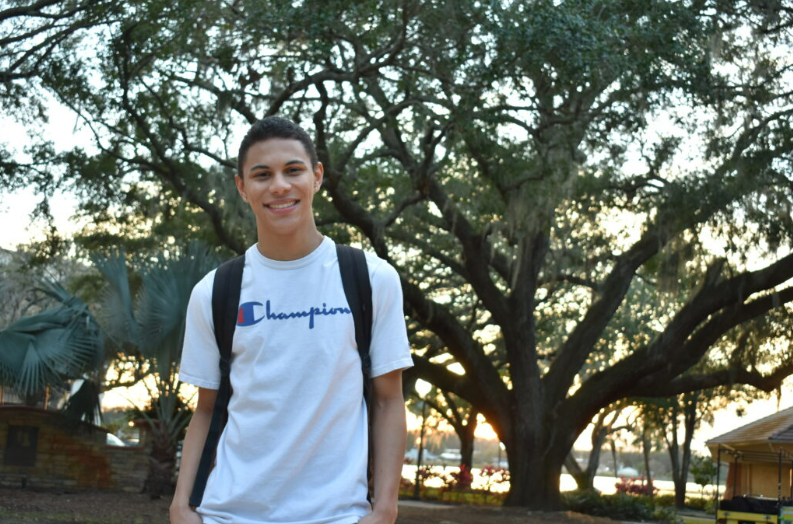
Jaylen Arnold, 22, has spoken to more than 300,000 students in 38 states and the United Kingdom and has educated many more online about Tourette Syndrome.
LAKELAND, FLA – Jaylen Arnold was 8 when he walked into his old elementary school to speak with two dozen or so former classmates, many of whom had recently taunted and physically bullied him.
Jaylen was scared. His mother, Robin, walking beside him, was proud.
The meeting was Jaylen’s idea. He wanted to explain what others saw as his unusual life.
Jaylen has Tourette Syndrome, a neurological disorder that causes sudden unwanted and uncontrolled rapid and repeated movements or vocal sounds called tics. He was an easy target, and the abuse from his peers sent his tics into overdrive.
He was classified as hospital homebound by his doctor and Robin removed him from the school.
Jaylen, now a senior at Southeastern University in Lakeland, has been an advocate for those with Tourette Syndrome and those who have been bullied for the last 14 years.
An education choice scholarship was about to change Jaylen’s life for the better.
It allowed him to attend a private school near his Lakeland home. There, Jaylen found schoolmates who looked past his Tourette’s, autism and obsessive-compulsive disorder and saw a likeable, intelligent and talented friend.
“He was accepted and loved,” Robin said.
It was acceptance and, if not love, at least tolerance that Jaylen wanted for others when he returned that day 14 years ago to his old school and met with his old classmates. He wanted to teach them about Tourette’s, hoping education would lead to understanding and that would reduce the bullying if not remove it completely.
“I wanted to go back and educate those who were tormenting me because who knows what kind of chain reaction that could have,” Jaylen, now 22, said.
There was a chain reaction, and it was nothing Jaylen or his mom envisioned.
To continue reading, click here.
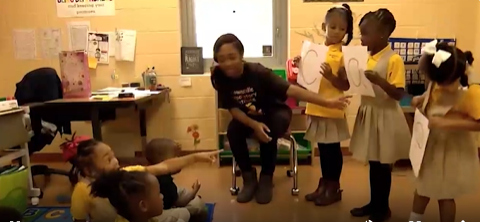
Brownsville Preparatory Institute in Tallahassee, Florida, offers children the opportunity to learn and grow in an environment that promotes self-confidence, social competence, and a lifetime love of learning. The school assists families financially by accepting the Florida Tax Credit Scholarship.
Editor’s note: Among those who came prepared Thursday to speak to Florida lawmakers in favor of legislation that would make education choice more flexible for families were two parents whose children have benefited from the Florida Tax Credit Scholarship. Lance Ball and Rebeka Joseph, both of Tallahassee, want legislators to create education savings accounts to further expand options.
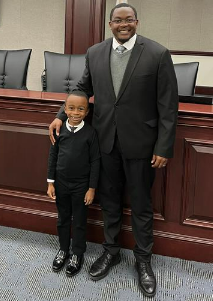
Lance Ball and his son Ian
Hello, Chair Broxson and members of this committee. My name is Lance Ball, and I live here in Tallahassee. My son Ian is a kindergartener at Brownsville Preparatory Institute. I’m here today to ask you to support this great bill expanding educational choice options.
Ian receives the Florida Tax Credit Scholarship. My wife and I are state employees and would not be able to afford the tuition without the help of the scholarship. We are “all in” on his education and are constantly thinking about new ways to sustain Ian’s love of learning.
We love Brownsville and the growth we’ve seen in our son since the beginning of the year. If the scholarship had flexibility in how its money could be spent, we would love to use it for things like afterschool academic enrichment programs. The scholarship has been a tremendous financial help to our family, and it’s setting Ian up for his bright future.
I ask that you make the current scholarship programs into education savings accounts, giving families like mine more flexibility in how they spend their children’s education dollars.
Thank you.
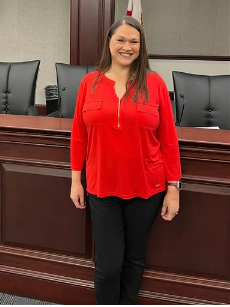
Rebeka Joseph
Good day, Chair Broxson and members of this committee. My name is Rebeka Joseph, and I live here in Tallahassee. I support Senate Bill 202 and want to share our family’s education choice story.
My twin daughters Eva and Leah are in the first grade at Cornerstone Learning Community. They both have Type-1 Diabetes. I chose Cornerstone because my daughters have compromised immune systems. They can’t attend just anywhere. At Cornerstone, we have a smaller population of students and staff and policies that make me feel comfortable sending my daughters there.
We receive the Florida Tax Credit Scholarship, and without it, we would not be able to afford tuition ourselves. Eva and Leah love Cornerstone and receive excellent one-one-one attention. I feel comfortable knowing they are safe, nurtured, and looked after closely at the school, so we don’t have to worry as much about their health and safety. Having more flexibility in how we spend their scholarship dollars would be a significant bonus.
Please pass this great bill so more families like mine can have more options in finding the best learning environment for their children that meets their unique needs.
Thank you.

A Florida school choice scholarship has made it possible for Kate Streets to participate on a swim team, a form of physical therapy for her.
On this episode, reimaginED senior writer Lisa Buie talks with Danyse Streets, a reading specialist who owns and operates Bridging the Reading Gap, a tutoring and special education advocacy company in Fleming Island, Florida, just south of Jacksonville. Her 12-year-old daughter, Kate, receives a Florida Family Empowerment Scholarship for Students with Unique Abilities, which Streets uses to customize her education.
“I'm thankful that it opened doors for me that I wasn't looking to have opened," Streets said. "But through all that, I started this business. I'm teaching kids how to read. I'm advocating for families. I'm helping other families, get the scholarship, so they can do what's best for their kids, and at the same time, still giving my child what she needs, educationally.”
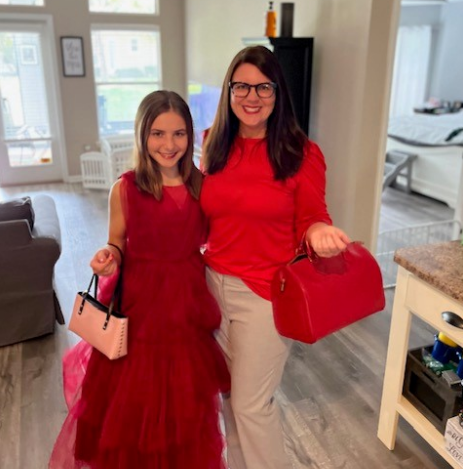
Kate and Danyse Streets
Streets said Kate, who was later diagnosed with dyslexia, was in pre-kindergarten when she noticed her struggling with letter names and sounds that were coming easily to her classmates. Suspecting it was a maturity issue, Streets had Kate repeat pre-kindergarten, a practice often called “academic redshirting,” which allows children more time to develop and master skills.
When that approach failed, and with kindergarten approaching, private school administrators told Streets that if her daughter couldn’t learn to a certain level, she couldn’t attend the school the next year. After a stint at another private school, the pandemic hit, and Streets homeschooled her daughter. She later sent her to a part-time tutor, where she made strides.
At the time, Streets didn’t qualify for a state choice scholarship because Florida law didn’t consider Kate’s situation a qualifying condition. Then in 2021, the law changed with the approval of HB 7045, which expanded the list of eligible conditions to include dyslexia.
The expansion opened up more possibilities for Streets to help Kate. She ultimately enrolled Kate with a small-group tutor that specializes in students with learning differences. She also was able to pay for Kate to get physical activity by participating on a swim team.
In addition to allowing Kate to get the education that was best for her, the scholarship program enabled Streets to put her skills as tutor to use as an entrepreneur. Bridging the Reading Gap, which accepts the FES-UA scholarship, provides part-time tutoring and advocates for students in special education to get the accommodations they need to succeed.
EPISODE DETAILS:
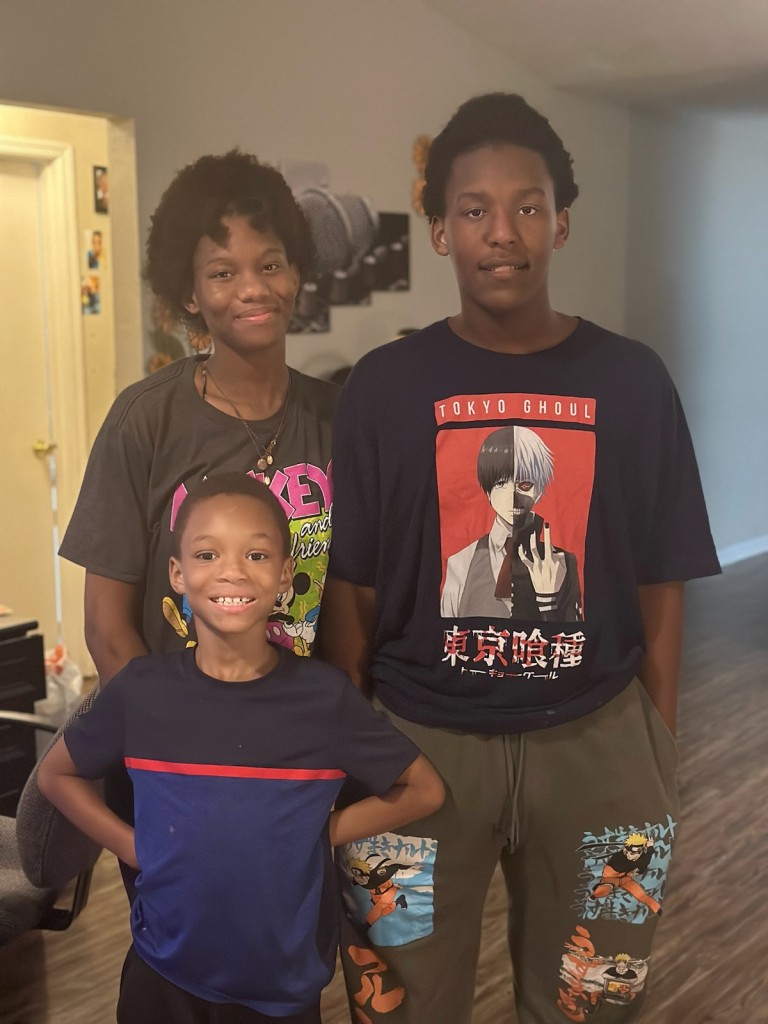
Three of Alkesha Williamson's five children attend private schools thanks to Florida education choice scholarships: Kenysis, 7; Kharmma, 12; and Krysis, 13.
On this episode, senior writer Lisa Buie talks with Alkesha Williamson, a mother of five children, including three who receive state education choice scholarships.
Williamson’s daughter is on the autism spectrum and receives the Family Empowerment Scholarship for Students with Unique Abilities, which uses an education savings account model that empowers parents to customize their children’s education through spending flexibility. Her two sons receive the Family Empowerment Scholarship for Education Options, which uses a traditional scholarship model.
Williamson, a single parent from Tallahassee who works three jobs, recently spoke before the House Choice and Innovation subcommittee in support of HB 1, a bill that would expand scholarship eligibility to all Florida students and convert all traditional scholarships to education savings accounts.
She has lived in three states, none of whose district schools worked well for her children. After letting them learn at home during the pandemic, they attend a private Christian school, thanks to state education choice scholarships. Williamson said she would welcome the chance that HB 1 and SB 202 would give her to have education savings accounts for her sons as well as her daughter.
“I would love for that to happen, and I really hope it does go that way. For them to be converted over to the educational savings accounts would be awesome because then that would open up more resources for my boys as well. and maybe we can go back to doing our homeschool thing, getting private tutors and things like that. And that way we can kind of schedule our own education on our own time, which would work out for me because I’m a very busy person.”
Episode details:
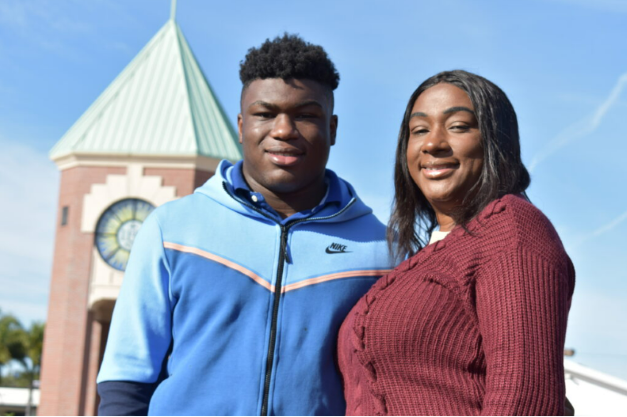
Joquez Smith, pictured with his mother, Joann, is heading to Temple University in Philadelphia, one of seven universities that offered him a football scholarship. As proud as he is of his success as an athlete, he is equally proud of his work in the classroom.
TAMPA – The numbers Joquez Smith compiled as a running back during his four years of high school football place him among the best to have ever played in Hillsborough County.
The numbers he’s earned in the classroom at Jesuit High School, an academically demanding Catholic school in Tampa, are just as impressive.
Combined, they helped “Jo” (as he’s nicknamed) earn a football scholarship to Temple University in Philadelphia.
Hi mom, Joann, said that was the plan since that October day in 2004 when Jo was born.
“From Day 1 I knew I wanted him to go to college and I knew a sports scholarship would help him,” Joann said.
The plan was realized with the help of a Florida Tax Credit Scholarship made possible by corporate donations to Step Up For Students.
“I want to say thank you to Step up,” Joann said. “Without the scholarship, Jo wouldn’t be able to be here and take advantage of what Jesuit has to offer. It’s done so much for our family. Academically, we know he’s ready for college.”
Academics ultimately is what led Jo to Jesuit.
Yes, he wanted to play for one of the top football programs in the state. That decision was clinched when Jo attended a Jesuit game as an eighth-grader. He was thrilled by the Friday night atmosphere at the school’s football stadium and wowed at the talent on the field.
Joann was sold that same year during an open house for eighth graders.
“When we visited Jesuit, they never promised anything (athletically),” she said. “They didn’t promise that he would be a starter. They didn’t promise him a certain jersey number. They were promising Jesuit, what they could do for Joquez academically. How to make Jo a better man, a stronger man, a giving man. And that’s what brought us to Jesuit.”
To continue reading, click here.
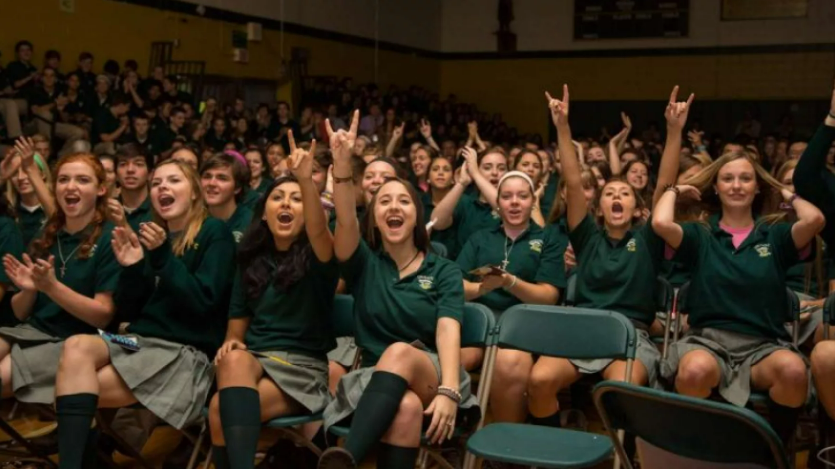
Landsdale High School in Landsdale, Pennsylvania, one of 1,814 private schools in the state serving more than 260,000 students, offers 44 honors and 36 college preparatory courses to encourage critical thinking and problem-solving skills.
Editor’s note: This commentary appeared Monday on inquirer.com.
After a more than eight-year slog, the Pennsylvania Commonwealth Court affirmed what the Pennsylvania Constitution has said all along: Kids deserve their education to be about a “meaningful opportunity,” not a flawed and antiquated system.
The ruling is a victory, especially for school-choice advocates, many of whom are parents of color, looking to help their children get out of failing district schools. When Commonwealth Court Judge Renée Cohn Jubelirer issued her ruling last week, she gave our most vulnerable children a path forward. The only way to ensure adequate and equitable funding to schools is to have education funding follow the child, not the school district.
The Pennsylvania education system is flawed — that much we can all agree on. The 2014 lawsuit alleged that the state’s system of determining school funding deprives students in poorer districts of opportunities and resources. The court agreed.
In doing so, the court made a critical point that deserves praise; it stopped short of massive judicial overreach and instead rightly highlighted what the state constitution has stated since 1873 — that the power to fix this problem rests with the legislature.
And in directing the people’s elected representatives to fix the problem, Judge Jubelirer took a bold stance, writing: “The options for reform are virtually limitless. The only requirement, that imposed by the Constitution, is that every student receives a meaningful opportunity to succeed academically, socially, and civically.”
The Pennsylvania Constitution calls for an “efficient system of public education.” Nothing is more efficient than the free market, and that’s what we would be creating in Pennsylvania if we follow the judge’s ruling.
If our state really wants to empower communities of color, then it should give money directly to parents and caregivers. By putting money directly into the hands of families — rather than into government schools run by bureaucrats, where funding tends to benefit administrators rather than students — parents have more options and children have more opportunities.
To continue reading, click here.
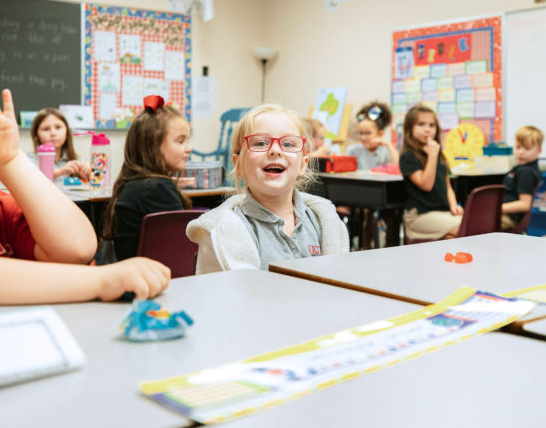
Victory Christian Academy in Lakeland, Florida, is one of dozens of private schools in Florida committed to assisting need-based families with financial assistance for tuition through the Florida Tax Credit Scholarship program.
Editor’s note: This essay was shared with reimaginED by Angelina Severino, a 2022 Future Leaders Fellow with the American Federation for Children.
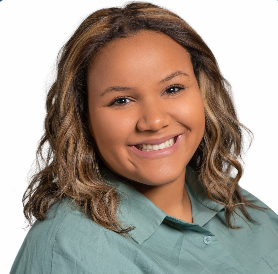
Angelina Severino
President Joe Biden, in his State of the Union address, covered many public policy topics, including education. I was disappointed that he did not mention how students can be given more choice in their education. I was disappointed because I know the difference having that choice made in my life.
When I was growing up, I never thought I would make it to college, much less be playing college-level sports or coaching my own team. I didn’t have a desire for school until I switched to a private school after attending a public school from kindergarten through sixth grade.
That setting was not right for me. It seemed my growth was stunted. I didn’t know what to do about it. My sister wasn’t getting what she needed at this school either. She was interested in a private school in town. Our mom set up an interview with the principal to discuss a transfer and I tagged along.
Unlike my sister, I was a rebel. I didn’t want to go to a school where students wore uniforms, but as I learned more about the school, I became curious. The principal noticed and asked if I would like to attend. My mother applied for a tax credit scholarship that helped cover my tuition.
Before I knew it, I was in uniform at Victory Christian Academy in Lakeland, Florida, starting my first day of seventh grade. I had no idea what a huge decision I had made.
Having the ability to choose my school gave me control over my own success. Not only did I receive an amazing education, but I was also able to focus on my faith, and I met a coach who would change my life. I soon realized that I had a family at home and at school.
The teachers cared about me and what I had to say. They listened to my opinions, and they showed me that I mattered as an individual. That felt good. As I started to feel more comfortable at school, I decided to dive into sports again.
I met Coach D, head of the varsity girls’ team. I didn’t know much about soccer, but that didn’t keep him from encouraging me to play from seventh grade until I graduated.
I had grown up under the care of an amazing single mother, feeling the absence of a father who hasn’t helped as much as I wish he would. I never really had a father figure until Coach D made the difference. Not only did he teach me how to play soccer; he also taught me how it feels to be loved and important. I have never taken this opportunity for granted.
Without the opportunities that came from my private school and the tax credit scholarship, I wouldn’t be playing and coaching basketball at Webber International University. I am grateful for school choice because it allowed me to find a family that believed in me and a coach who never doubted me.
Going forward, I hope that all policymakers, regardless of political persuasion, realize what education choice can mean to the life of a child. Take it from me: It can mean the world.

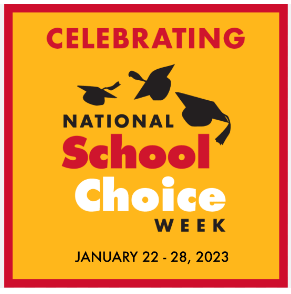 Editor's note: National School Choice Week 2023 kicked off Monday and continues through Saturday. The event celebrates K-12 options available to families while generating public awareness of the importance of ensuring that every child has the opportunity to find the best educational fit.
Editor's note: National School Choice Week 2023 kicked off Monday and continues through Saturday. The event celebrates K-12 options available to families while generating public awareness of the importance of ensuring that every child has the opportunity to find the best educational fit.
More than 1.6 million K-12 students in Florida – nearly 49% of the student population – are using the education option selected by their parent or guardian as an alternative to attending their traditionally assigned district school.
These findings come from the Florida Department of Education, which compiled data for the 2021-22 school year, and are reflected in Step Up For Students’ annual Florida Changing Landscapes report.
[pdf-embedder url="https://nextstepsblog.org/wp-content/uploads/2023/01/Changing-Landscape-Development-One-Pager-2023-Digital-v4.pdf"]
The number of students utilizing education choice increased by nearly 65,000 over the prior school year. Charter schools, which are privately operated public schools, remained the most popular option, followed by open enrollment and magnet schools, both district-run school choice options.
The Florida Tax Credit Scholarship fell from seventh to eighth place, trading places with Advanced International Certificate of Education programs for 11th and 12th grade students.
FTC’s decline was due to the enrollment increase in the similar, income-based Family Empowerment Scholarship for Educational Options. That program was Florida’s fastest growing, increasing by 101% over the prior year.
Public school open enrollment grew by 27% and AICE grew by 17%.
A decline in McKay Scholarship private school enrollment was due in part to the enrollment increase in the Family Empowerment Scholarship for Students With Unique Abilities, which grew by nearly 35%. McKay was folded into the FES-UA program for the 2022-23 school year.
Full-time virtual instruction declined from a post-COVID high, falling 33% during the 2021-22 school year.
The Florida Department of Education used data from its Final Survey 2 as well as from its quarterly reports and program fact sheets published by the Office of K-12 School Choice.

Editor’s note: Former Florida Gov. Jeb Bush, chairman and founder of the Foundation for Florida’s Future, issued the following statement in response to the filing of HB 1. The bill would significantly expand eligibility for education choice options to all K-12 students in Florida.
“The right to a publicly funded education is a promise our state makes to every student and yesterday, Speaker Paul Renner and members of the legislature took bold steps to ensure each and every Florida student can access the education of their choice.
“Florida stands on the monumental verge of restoring the original intent of publicly funding education – by funding individual students – so each child can reach their God-given potential. HB1 is a forward thinking and important move toward ensuring Florida remains the nation’s leader in student-centered solutions. I applaud Speaker Renner and the Florida House for their vision and leadership in creating this unmatched opportunity for Florida students and families.”
House Bill 1, released by Speaker Paul Renner and sponsored by Rep. Kaylee Tuck, will significantly expand school choice options for all Florida K-12 students.
You can read the full test of the bill here.

Peyton Williams was born with a heart defect that weakened her immune system. She is on the autism spectrum, has attention-deficit/hyperactivity disorder and obsessive-compulsive disorder, and has “false vocal cords,” which means she can speak barely above a whisper.
OKEECHOBEE – Peyton Williams entered this world with a damaged heart, a damaged airway and hardly any hope from doctors who examined her the day she was born. They told her mother her baby wouldn’t survive her first 24 hours. Then she was told Peyton wouldn’t live to her first birthday.
Peyton celebrated her 12th birthday two days before Christmas.
She has scars on her chest from three open heart surgeries, the first when she was six days old, but no visible marks on her throat from the nine years she wore a tracheal tube. Her mom, Le-Ann Williams, said Peyton has endured 98 surgeries and spent more than half her life in hospitals.
“She’s a walking miracle,” Le-Ann said.
Doctors said Peyton wouldn’t walk or talk or run. Peyton does all those things, and she also swims, fishes, camps, cooks, plays the violin, and makes her own videos that she posts on YouTube.
“She has overcome everything they told us she wouldn’t overcome,” Le-Ann said.
It wouldn’t have been possible without some help from Florida’s Family Empowerment Scholarship for Students with Unique Abilities (FES-UA) managed by Step Up For Students.
To continue reading, click here.